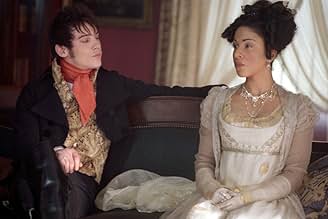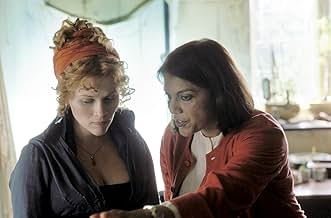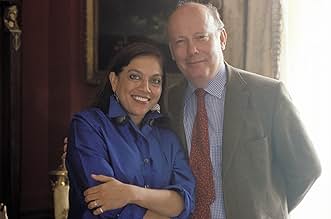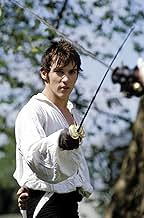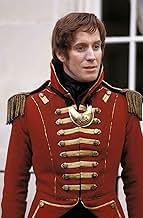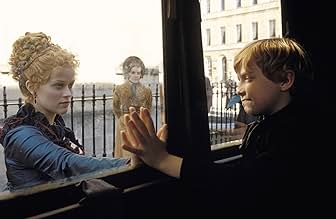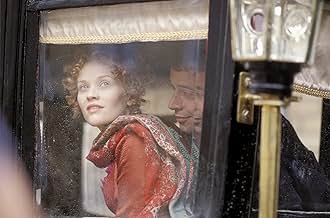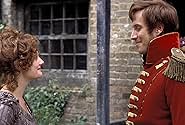CALIFICACIÓN DE IMDb
6.2/10
24 k
TU CALIFICACIÓN
La inteligente y luchadora hija de un pintor fallecido comienza a ascender en una sociedad que aleja a las mujeres del reconocimiento.La inteligente y luchadora hija de un pintor fallecido comienza a ascender en una sociedad que aleja a las mujeres del reconocimiento.La inteligente y luchadora hija de un pintor fallecido comienza a ascender en una sociedad que aleja a las mujeres del reconocimiento.
- Dirección
- Guionistas
- Elenco
- Premios
- 2 premios ganados y 5 nominaciones en total
Lillete Dubey
- Ms. Green
- (as Lillette Dubey)
Opiniones destacadas
In many ways, director Mira Nair is a daring, imaginative choice to helm this latest film adaptation of William Makepeace Thackeray's classic novel of social mores in early 19th century England. But the end result of her vision is on the whole, rather disappointing. What could have been an energetic distillation of the book's themes turns into a lengthy episodic movie suffering from poor pacing and softened characters. It is a feast for the eyes though, as it appears Nair is intent on bringing her native India into the film as much as possible from the brightly colored period costumes to the contemporary-looking exotic dance at the Marquess of Steyne's party (with very anachronistic Rai music in the background) to the happy ending atop an elephant in Jodhpur. All these references remain true to the Calcutta-born author's story, and actually they feed into the English imagination of what India meant to them at the time. At the same time, the images are too overwhelming to make the basic story of Becky Sharp resonate as it should. Her evolution is the heart of the story, as she moves from finishing school outsider to resourceful governess to brave captain's wife to fallen woman in a casino. It's a long, rocky journey, almost too long for a 137-minute movie to bear as it turns out. Nair, however, also has a good handle on the comic banter among the characters, and it certainly helps that she has assembled a "Who's Who" of British stage and film in all the roles except the primary one.
As Becky, Reese Witherspoon gives it a valiant effort and perfects her British accent to Gwyneth Paltrow's standards, but she seems to be channeling a hybrid of her Elle Woods ("Legally Blonde") and her Tracy Flick (in Alexander Payne's "Election") by way of Kate Winslet in "Sense and Sensibility". When facing down her opponents in her climb upward, especially in the early scenes, the performance seems right. But when her character takes on Scarlett O'Hara dimensions in wartime suffering and acts of betrayal, she seems young and overwhelmed, and her reactions come across as too modern to be true to the character's evolution as intended. This anomaly results in a Becky Sharp who is not so much an ambitious social climber but a plucky heroine for the underclasses, a textbook example of a Tony Robbins motivational seminar. This transformation may seem endearing to those looking for nicely wrapped tales of triumph against all odds, but it doesn't lend credibility to the more pointed satire and harsher criticisms that Thackeray had in mind when he wrote the book. For example, Becky's gambler husband, Rawdon Crawley, is really more of a ne'er-do-well whose departure in the story should be viewed somewhat as relief, but as played by James Purefoy, he is a romantic figure who is guilt-ridden over his failure to provide for his family. The change could have been acceptable were it not for the fact that his character is discarded in an almost matter-of-fact way. The same sketchy treatment is given to Becky's only friend, Amelia Sedley, played by Romola Garai, who is set up as a contrast to Becky and comes across as a wet rag for much of the story. But the film transforms her into a brave widow whose romantic resolution at the end strains credibility. Somehow Purefoy and Garai acquit themselves admirably regardless.
There are many fine performances in the smaller roles. Worth mentioning are Jim Broadbent as roguish George Osborne's unforgiving father, Bob Hoskins as the clownishly pitiable Sir Pitt; Gabriel Byrne as the territorially devious Marquess of Steyne, and Geraldine McEwan's helium-voiced Lady Southdown. Best of all is the mordantly witty Eileen Atkins, who seems to understand the tone of Thackeray's story better than anyone else, and lends a dotty authority to the role of Aunt Mathilde, serving as the primary catalyst of Becky's social escalation much to her later regret. Great acting aside, the film's length does have a wearing effect since the climax does not bear the emotional weight of everything that has gone before it, and unfortunately the plot strands get wrapped up much too quickly at the end to make the story truly resonate. That's a shame since there is so much creative energy obviously at work here.
As Becky, Reese Witherspoon gives it a valiant effort and perfects her British accent to Gwyneth Paltrow's standards, but she seems to be channeling a hybrid of her Elle Woods ("Legally Blonde") and her Tracy Flick (in Alexander Payne's "Election") by way of Kate Winslet in "Sense and Sensibility". When facing down her opponents in her climb upward, especially in the early scenes, the performance seems right. But when her character takes on Scarlett O'Hara dimensions in wartime suffering and acts of betrayal, she seems young and overwhelmed, and her reactions come across as too modern to be true to the character's evolution as intended. This anomaly results in a Becky Sharp who is not so much an ambitious social climber but a plucky heroine for the underclasses, a textbook example of a Tony Robbins motivational seminar. This transformation may seem endearing to those looking for nicely wrapped tales of triumph against all odds, but it doesn't lend credibility to the more pointed satire and harsher criticisms that Thackeray had in mind when he wrote the book. For example, Becky's gambler husband, Rawdon Crawley, is really more of a ne'er-do-well whose departure in the story should be viewed somewhat as relief, but as played by James Purefoy, he is a romantic figure who is guilt-ridden over his failure to provide for his family. The change could have been acceptable were it not for the fact that his character is discarded in an almost matter-of-fact way. The same sketchy treatment is given to Becky's only friend, Amelia Sedley, played by Romola Garai, who is set up as a contrast to Becky and comes across as a wet rag for much of the story. But the film transforms her into a brave widow whose romantic resolution at the end strains credibility. Somehow Purefoy and Garai acquit themselves admirably regardless.
There are many fine performances in the smaller roles. Worth mentioning are Jim Broadbent as roguish George Osborne's unforgiving father, Bob Hoskins as the clownishly pitiable Sir Pitt; Gabriel Byrne as the territorially devious Marquess of Steyne, and Geraldine McEwan's helium-voiced Lady Southdown. Best of all is the mordantly witty Eileen Atkins, who seems to understand the tone of Thackeray's story better than anyone else, and lends a dotty authority to the role of Aunt Mathilde, serving as the primary catalyst of Becky's social escalation much to her later regret. Great acting aside, the film's length does have a wearing effect since the climax does not bear the emotional weight of everything that has gone before it, and unfortunately the plot strands get wrapped up much too quickly at the end to make the story truly resonate. That's a shame since there is so much creative energy obviously at work here.
6=G=
"Vanity Fair" (2004) is an acceptable but abbreviated version of the classic Thackery Victorian period novel which tells of Becky Sharp (Witherspoon), who uses artifice and charm to climb from lowly governess to aristocrat, always able to find a suitable family of peerage or property to use as a rung in her ladder to the top in spite of the tribulations of the time. At just over two hours, this film cannot deal in depth with the many characters in the story and has to content itself with hitting the high points which make for a very condensed telling suited to those who only wish the flavor of the story. Those with a particular interest in Victorian pulp fiction or more expansive dramas should turn to the BBC's 1998 six hour miniseries which offers greater character depth, a presentation much more true to the period, and a very much better cast. (B-)
William Makepeace Thackeray's novel "Vanity Fair" is a satire telling of the rise, fall and rise again of the social-climbing adventuress Becky Sharp. Like a number of other literary heroines from this period, most notably Charlotte Bronte's Jane Eyre, Becky starts life as a governess, although she and Jane Eyre are completely different in character. Whereas Jane is morally upright and deeply religious, Becky is scheming and unscrupulous. (Her surname has an obvious symbolic meaning). She marries Rawdon Crawley, an Army officer and the younger son of her employer, becomes the mistress of the wealthy Lord Steyne and, after various reverses of fortune, ends up as the wife of a senior official with the East India Company.
Thackeray's title is taken from Bunyan's "Pilgrim's Progress" and refers to a fair which was intended to symbolise man's sinful attachment to the things of this world. His intention was to satirise the snobbishness, hypocrisy and worldliness of British society. Although the events described in the novel take place in the 1810s and 1820s, two or three decades before it was published in 1848, he clearly intended it to have a contemporary relevance, and his readers would have had no difficulty identifying the Becky Sharps and Lord Steynes of their own day.
The author described it as a "novel without a hero", and few, if any, of its characters are intended to come across as sympathetic. We may admire Becky's cunning and determination, but her ruthlessness and amorality mark her out as the novel's anti-heroine rather than its heroine. Her husband Rawdon is as amoral as her, and considerably more stupid. Steyne (pronounced "stain"- another symbolic name) is a libertine and a bully. Rawdon's father Sir Pitt Crawley is an oafish vulgarian and his brother Pitt junior a pompous prig. Becky's friend Amelia Sedley is, unlike Becky herself, morally upright, but is also rather dull, lacking in intelligence and a poor judge of character. She persists, for example, in believing, in the teeth of all the evidence, that her rakish fiancé George Osborne, who later becomes her husband, is a paragon of virtue.
The novel has been the subject of numerous television and film adaptations, although this is the only one I have seen apart from the British television version from the late eighties. That adaptation kept to Thackeray's plot reasonably faithfully, but scriptwriter Julian Fellowes and director Mira Nair evidently thought that that plot would not work on the big screen because they made a number of changes, most notably to the character of Becky, who becomes far more sympathetic than she was in the original. (There was, apparently, an earlier discarded screenplay in which Becky's character was closer to the way she is depicted in the novel). The character of her husband Rawdon is also somewhat sanitised, and even Steyne at first seems more like a kindly benefactor than a sexual predator. It is only at the end that he reveals himself in his true colours.
No film based upon a novel, especially a novel as complex as "Vanity Fair", can ever be 100% faithful to the original, and a number of literary adaptations have been highly successful films in their own right despite departing considerably from their source material. This, however, is not really one of them. If you want to make a film about a feisty young proto-feminist in the Regency era- which is how Fellowes paints Becky- I would not really recommend using Thackeray's novel as a starting-point. Deprived of much of its satirical content, "Vanity Fair" becomes emasculated, just another "heritage cinema" British costume drama.
Yet this is not entirely a bad film. Reese Witherspoon makes Becky into an appealing heroine, and cannot be held personally to blame for the fact that the character she is playing is far from being the one that Thackeray created. Her British accent is perhaps not 100% reliable, but this is not so important in period drama, as we do not know exactly how people spoke in the early nineteenth-century, and the difference between British and American accents may have been less marked than it is today. There are also some good performances in cameo roles from the likes of Bob Hoskins as the uncouth Sir Pitt and Eileen Atkins as his wealthy and autocratic sister Miss Matilda.
Another attractive feature is the visual look of the film. Nair was clearly aiming to reproduce the look of an Old Master painting, and does this by the use of strong, vivid colours, especially reds and greens, shot through a filter which gives a slightly yellow tint, like a picture seem through a protective layer of varnish. I felt, however, that this is a film which could have been improved had it followed the original novel more closely. 6/10
Thackeray's title is taken from Bunyan's "Pilgrim's Progress" and refers to a fair which was intended to symbolise man's sinful attachment to the things of this world. His intention was to satirise the snobbishness, hypocrisy and worldliness of British society. Although the events described in the novel take place in the 1810s and 1820s, two or three decades before it was published in 1848, he clearly intended it to have a contemporary relevance, and his readers would have had no difficulty identifying the Becky Sharps and Lord Steynes of their own day.
The author described it as a "novel without a hero", and few, if any, of its characters are intended to come across as sympathetic. We may admire Becky's cunning and determination, but her ruthlessness and amorality mark her out as the novel's anti-heroine rather than its heroine. Her husband Rawdon is as amoral as her, and considerably more stupid. Steyne (pronounced "stain"- another symbolic name) is a libertine and a bully. Rawdon's father Sir Pitt Crawley is an oafish vulgarian and his brother Pitt junior a pompous prig. Becky's friend Amelia Sedley is, unlike Becky herself, morally upright, but is also rather dull, lacking in intelligence and a poor judge of character. She persists, for example, in believing, in the teeth of all the evidence, that her rakish fiancé George Osborne, who later becomes her husband, is a paragon of virtue.
The novel has been the subject of numerous television and film adaptations, although this is the only one I have seen apart from the British television version from the late eighties. That adaptation kept to Thackeray's plot reasonably faithfully, but scriptwriter Julian Fellowes and director Mira Nair evidently thought that that plot would not work on the big screen because they made a number of changes, most notably to the character of Becky, who becomes far more sympathetic than she was in the original. (There was, apparently, an earlier discarded screenplay in which Becky's character was closer to the way she is depicted in the novel). The character of her husband Rawdon is also somewhat sanitised, and even Steyne at first seems more like a kindly benefactor than a sexual predator. It is only at the end that he reveals himself in his true colours.
No film based upon a novel, especially a novel as complex as "Vanity Fair", can ever be 100% faithful to the original, and a number of literary adaptations have been highly successful films in their own right despite departing considerably from their source material. This, however, is not really one of them. If you want to make a film about a feisty young proto-feminist in the Regency era- which is how Fellowes paints Becky- I would not really recommend using Thackeray's novel as a starting-point. Deprived of much of its satirical content, "Vanity Fair" becomes emasculated, just another "heritage cinema" British costume drama.
Yet this is not entirely a bad film. Reese Witherspoon makes Becky into an appealing heroine, and cannot be held personally to blame for the fact that the character she is playing is far from being the one that Thackeray created. Her British accent is perhaps not 100% reliable, but this is not so important in period drama, as we do not know exactly how people spoke in the early nineteenth-century, and the difference between British and American accents may have been less marked than it is today. There are also some good performances in cameo roles from the likes of Bob Hoskins as the uncouth Sir Pitt and Eileen Atkins as his wealthy and autocratic sister Miss Matilda.
Another attractive feature is the visual look of the film. Nair was clearly aiming to reproduce the look of an Old Master painting, and does this by the use of strong, vivid colours, especially reds and greens, shot through a filter which gives a slightly yellow tint, like a picture seem through a protective layer of varnish. I felt, however, that this is a film which could have been improved had it followed the original novel more closely. 6/10
William Thackerey's "Vanity Fair" has been adapted for the screen and television in numerous occasions. It is almost an impossible task to get a coherent take on a narrative that spans a lot of years and in which a lot happens.
This adaptation of the book by Mira Nair with the adaptation by Julian Fellowes, is sumptuously photographed by Declan Quinn, who captures the Regency period in the England at the beginning of the XIX century. Ms. Nair's touch is evident in the way the costumes have an Indian flair as they were brilliantly executed by designer Beatrix Aruna Pasztor. Maria Djurkovic's wonderful production design is also an asset.
If anything, this reincarnation of the Thackerey's novel is a joy for the eyes. The rich period in which the action takes place comes alive in the screen as a feast of colors, which in a way, compensate for the failings on the story and in the way Ms. Nair conceived the way she wanted to tell this tale about an ambitious young woman who is the epitome of social climbing. As a character puts in the film, Becky Sharp would be a perfect mountaineer.
Part of what is wrong with the film is Reese Witherspoon in the central role. Not that her interpretation is wrong, it's that she doesn't project the character of Becky Sharp with an intensity that another actress might have brought to the role. In part, this might not have been Ms. Witherspoon's fault, but the director's, in the way she guided the key performance.
The other failure of the film lies in the last scenes in which one finds Becky in Baden-Baden. Becky, Amelia, and Dobbins, haven't aged one iota. For the sake of realism, a bit of old age makeup should have been applied to these actors, or else, one might believe in the curative waters of that German spa. If it was true, we should be taking the next flight to Germany. After all, if that were the case, it would be the end of plastic surgery as we know it!
Some of the best actors of the English stage and screen are seen in various roles. Bob Hoskins, Eileen Atkins, Jim Broadbent, Gabriel Byrne, Barbara Leigh-Hunt, Rhys Ifan, Romola Garai, Jonathan Rhys-Meyer, James Purefoy, just to name a few, do an excellent job in the portrayal of their characters.
This "Vanity Fair", although flawed, is not a total failure. Mira Nair shows an amazing talent for being in command of such a large project.
This adaptation of the book by Mira Nair with the adaptation by Julian Fellowes, is sumptuously photographed by Declan Quinn, who captures the Regency period in the England at the beginning of the XIX century. Ms. Nair's touch is evident in the way the costumes have an Indian flair as they were brilliantly executed by designer Beatrix Aruna Pasztor. Maria Djurkovic's wonderful production design is also an asset.
If anything, this reincarnation of the Thackerey's novel is a joy for the eyes. The rich period in which the action takes place comes alive in the screen as a feast of colors, which in a way, compensate for the failings on the story and in the way Ms. Nair conceived the way she wanted to tell this tale about an ambitious young woman who is the epitome of social climbing. As a character puts in the film, Becky Sharp would be a perfect mountaineer.
Part of what is wrong with the film is Reese Witherspoon in the central role. Not that her interpretation is wrong, it's that she doesn't project the character of Becky Sharp with an intensity that another actress might have brought to the role. In part, this might not have been Ms. Witherspoon's fault, but the director's, in the way she guided the key performance.
The other failure of the film lies in the last scenes in which one finds Becky in Baden-Baden. Becky, Amelia, and Dobbins, haven't aged one iota. For the sake of realism, a bit of old age makeup should have been applied to these actors, or else, one might believe in the curative waters of that German spa. If it was true, we should be taking the next flight to Germany. After all, if that were the case, it would be the end of plastic surgery as we know it!
Some of the best actors of the English stage and screen are seen in various roles. Bob Hoskins, Eileen Atkins, Jim Broadbent, Gabriel Byrne, Barbara Leigh-Hunt, Rhys Ifan, Romola Garai, Jonathan Rhys-Meyer, James Purefoy, just to name a few, do an excellent job in the portrayal of their characters.
This "Vanity Fair", although flawed, is not a total failure. Mira Nair shows an amazing talent for being in command of such a large project.
'Vanity Fair' is the perfect title for this story, showing us a world of cold characters with impersonal motives; a world where marriage is just another move in a chess game where the opponent is poverty and, perhaps more importantly, unpopularity. At the center of this movie is Becky Sharp (Reese Witherspoon), a beautiful blonde from a terribly poor family (her father was a talented but poor artist). We meet her first when she is a young girl, and we see that she is already stubborn and manipulative, when she demands ten guineas for a portrait of her mother that is being sold to a wealthy aristocrat (Gabriel Byrne) for four. He agrees, probably not because he thinks it's worth it, but because he admires the fire and spirit in the young girl. He'll come into play later.
We see her next after completing finishing school and being sent off to be a governess for Sir Pitt Crawley (Bob Hoskins), a scruffy old man who's just barely getting by, with a dusty mansion and rude servants. She leaves for Pitt with her friend Amelia (Romola Garai), who is engaged to an officer George Osborne (Jonathan Rhys-Meyers). Amelia's engagement does not stop her from talking to Becky about the benefits of marrying a wealthy man, and it is here that we first see the mindset of most of the women in the film. Since they don't have many promising career prospects (those were for the men) they want to seduce a rich man to gain wealth, and popularity, and happiness too, I guess.
And Becky is great at playing the game. When she stays with Amelia's family in London before going to the Crawleys, she meets Amelia's awkward (and heavy) brother (Tony Maudsley), a wealthy man from India, and starts a seduction that is in a way kind of obvious, but she knows that the insecure Joseph couldn't possibly see through it. And he doesn't, he wants to marry her, and she wants that, but it's George who talks him out of it.
So, Becky is finished with her detour and moves to the Crawley's, where she teaches his kids perfect French and even cleans up the mansion when his wealthy sister Matilde (Eileen Atkins) arrives. Matilde is an undeniable snob who claims to have a romantic heart, but with mean put-downs ready for everyone in the house. She takes a liking to Becky for her own cleverness and invites her to live with her and her nephew Rawdon Crawley (James Purefoy) in London. Becky accepts, of course, it's another step up.
So, she is back in London and reunites with Amelia, George, and George's soldier friend William Dobbin (Rhys Ifans). She also recognizes Matilde's neighbor, Lord Steyne, the man who bought her mother's portrait all those years ago. She's back in the game, but she falls prey to her heart and elopes with Rawdon, angering Matilde enough to cut Rawdon out of her will (she loves romantic stories, she says, but not in real life!).
Becky hasn't been completely consumed by her love, though. She still has that cunning agenda of her own, which includes getting pregnant in hopes of gaining sympathy from Matilde, and attending all the major parties, shows and banquets in London despite her lower class.
But Rawdon is a gambler and their wealth and public image starts to drop significantly. This is when we see the extent of Becky's agenda, when she accepts Steyne as her mentor, despite his A) being a horrible man and B) clearly wanting Becky for his bedroom, not his student. But Steyne is seductive in his own right, and buys Becky the most expensive and beautiful jewelry, shows her to great parties and even casts her as the lead in a dance show he directed. Their relationship is one of the most intriguing points of the film, kind of similar to that of Fast Eddie Felson and Bert Gordon, and Laura Hunt and Waldo Lydecker.
Despite most of its characters being cunning and sinister, 'Vanity Fair' is a distinctly moral movie. Pitt Crawley Jr. (Douglas Hodge) is awkward and kind of dull, but his honesty and kindness gives him a stable, happy life, and Joseph's own earnestness pays off for him in the end. But the most important is the story of William Dobbin's undying love for Amelia, and how he's so gentlemanly about it. He doesn't urge her into adultery, and when she mistakes a piano he's bought for her for a present from George he doesn't correct her. I won't say how this story ends, but it'll most likely pull a tear from the girls in the audience. Ifans' is a fantastic, heartbreaking performance, the best of the movie.
Mira Nair's direction is awesome as well, what other director could make a passable (even good) glittery, belly-dancing scene in a Victorian drama. The Oscar for costume design will most certainly go to this, and its set design makes the best competition to 'The Terminal' so far this year.
As for acting Oscars, well, the way the movie switches from story to story doesn't quite let us get to know most of the characters, but some great performances can still be found here. Particularly Rhys Ifans, whose performance is so quiet and strong, and Eileen Atkins, who is perfect and hilarious, a true scene-stealer of her performance (and maybe even Byrne, too).
And then there's Witherspoon, in one of her best performances as Becky Sharp, the girl who, after learning her lesson by the end, is so stubborn that she's at it again, 7.5/10.
We see her next after completing finishing school and being sent off to be a governess for Sir Pitt Crawley (Bob Hoskins), a scruffy old man who's just barely getting by, with a dusty mansion and rude servants. She leaves for Pitt with her friend Amelia (Romola Garai), who is engaged to an officer George Osborne (Jonathan Rhys-Meyers). Amelia's engagement does not stop her from talking to Becky about the benefits of marrying a wealthy man, and it is here that we first see the mindset of most of the women in the film. Since they don't have many promising career prospects (those were for the men) they want to seduce a rich man to gain wealth, and popularity, and happiness too, I guess.
And Becky is great at playing the game. When she stays with Amelia's family in London before going to the Crawleys, she meets Amelia's awkward (and heavy) brother (Tony Maudsley), a wealthy man from India, and starts a seduction that is in a way kind of obvious, but she knows that the insecure Joseph couldn't possibly see through it. And he doesn't, he wants to marry her, and she wants that, but it's George who talks him out of it.
So, Becky is finished with her detour and moves to the Crawley's, where she teaches his kids perfect French and even cleans up the mansion when his wealthy sister Matilde (Eileen Atkins) arrives. Matilde is an undeniable snob who claims to have a romantic heart, but with mean put-downs ready for everyone in the house. She takes a liking to Becky for her own cleverness and invites her to live with her and her nephew Rawdon Crawley (James Purefoy) in London. Becky accepts, of course, it's another step up.
So, she is back in London and reunites with Amelia, George, and George's soldier friend William Dobbin (Rhys Ifans). She also recognizes Matilde's neighbor, Lord Steyne, the man who bought her mother's portrait all those years ago. She's back in the game, but she falls prey to her heart and elopes with Rawdon, angering Matilde enough to cut Rawdon out of her will (she loves romantic stories, she says, but not in real life!).
Becky hasn't been completely consumed by her love, though. She still has that cunning agenda of her own, which includes getting pregnant in hopes of gaining sympathy from Matilde, and attending all the major parties, shows and banquets in London despite her lower class.
But Rawdon is a gambler and their wealth and public image starts to drop significantly. This is when we see the extent of Becky's agenda, when she accepts Steyne as her mentor, despite his A) being a horrible man and B) clearly wanting Becky for his bedroom, not his student. But Steyne is seductive in his own right, and buys Becky the most expensive and beautiful jewelry, shows her to great parties and even casts her as the lead in a dance show he directed. Their relationship is one of the most intriguing points of the film, kind of similar to that of Fast Eddie Felson and Bert Gordon, and Laura Hunt and Waldo Lydecker.
Despite most of its characters being cunning and sinister, 'Vanity Fair' is a distinctly moral movie. Pitt Crawley Jr. (Douglas Hodge) is awkward and kind of dull, but his honesty and kindness gives him a stable, happy life, and Joseph's own earnestness pays off for him in the end. But the most important is the story of William Dobbin's undying love for Amelia, and how he's so gentlemanly about it. He doesn't urge her into adultery, and when she mistakes a piano he's bought for her for a present from George he doesn't correct her. I won't say how this story ends, but it'll most likely pull a tear from the girls in the audience. Ifans' is a fantastic, heartbreaking performance, the best of the movie.
Mira Nair's direction is awesome as well, what other director could make a passable (even good) glittery, belly-dancing scene in a Victorian drama. The Oscar for costume design will most certainly go to this, and its set design makes the best competition to 'The Terminal' so far this year.
As for acting Oscars, well, the way the movie switches from story to story doesn't quite let us get to know most of the characters, but some great performances can still be found here. Particularly Rhys Ifans, whose performance is so quiet and strong, and Eileen Atkins, who is perfect and hilarious, a true scene-stealer of her performance (and maybe even Byrne, too).
And then there's Witherspoon, in one of her best performances as Becky Sharp, the girl who, after learning her lesson by the end, is so stubborn that she's at it again, 7.5/10.
¿Sabías que…?
- TriviaAfter asking Reese Witherspoon to get pregnant for the role (as a joke, because she thought Reese was too thin), director Mira Nair was delighted when Witherspoon announced she was pregnant after all.
- ErroresDuring the dance scene, a musician plays a metal flute, which was invented by Theobald Boehm around 1832.
- Citas
Mrs. Sedley: I thought her a mere social climber, but now I see she's a mountineer
- Créditos curiososBefore the credits start rolling the word "Alvida" (goodbye) appears in Urdu script. Beneath it is the following dedication: for our beloved Ammy Kulsum Alibhai 1927-2003
- Bandas sonorasShe Walks in Beauty
Lyrics by Lord Byron (as Lord George Gordon Byron)
Music by Mychael Danna
Produced by Mychael Danna
Performed by Sissel (as Sissel)
Sissel appears courtesy of Universal Music, AS Norway and Stageway Talent, AS
Selecciones populares
Inicia sesión para calificar y agrega a la lista de videos para obtener recomendaciones personalizadas
- How long is Vanity Fair?Con tecnología de Alexa
Detalles
- Fecha de lanzamiento
- Países de origen
- Idiomas
- También se conoce como
- Vanity Fair
- Locaciones de filmación
- Holburne Museum of Art, Bath, Somerset, Inglaterra, Reino Unido(Lord Steyne's residence)
- Productoras
- Ver más créditos de la compañía en IMDbPro
Taquilla
- Presupuesto
- USD 23,000,000 (estimado)
- Total en EE. UU. y Canadá
- USD 16,136,476
- Fin de semana de estreno en EE. UU. y Canadá
- USD 4,800,000
- 5 sep 2004
- Total a nivel mundial
- USD 19,463,185
- Tiempo de ejecución2 horas 21 minutos
- Color
- Mezcla de sonido
- Relación de aspecto
- 2.35 : 1
Contribuir a esta página
Sugiere una edición o agrega el contenido que falta

Principales brechas de datos
By what name was Vanidad (2004) officially released in India in English?
Responda

